仁爱英语九年级Unit1 Topic1学案 2
九年级Unit1教案(仁爱版)
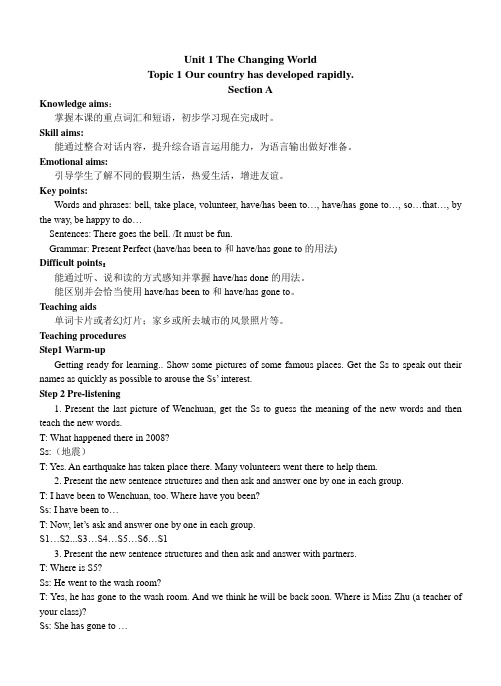
Unit 1 The Changing WorldTopic 1 Our country has developed rapidly.Section AKnowledge aims:掌握本课的重点词汇和短语,初步学习现在完成时。
Skill aims:能通过整合对话内容,提升综合语言运用能力,为语言输出做好准备。
Emotional aims:引导学生了解不同的假期生活,热爱生活,增进友谊。
Key points:Words and phrases: bell, take place, volunteer, have/has been to…, have/has gone to…, so…that…, by the way, be happy to do…Sentences: There goes the bell. /It must be fun.Grammar: Present Perfect (have/has been to和have/has gone to的用法)Difficult points:能通过听、说和读的方式感知并掌握have/has done的用法。
能区别并会恰当使用have/has been to和have/has gone to。
Teaching aids单词卡片或者幻灯片;家乡或所去城市的风景照片等。
Teaching proceduresStep1 Warm-upGetting ready for learning.. Show some pictures of some famous places. Get the Ss to speak out their names as qu ickly as possible to arouse the Ss’ interest.Step 2 Pre-listening1. Present the last picture of Wenchuan, get the Ss to guess the meaning of the new words and then teach the new words.T: What happened there in 2008?Ss:(地震)T: Yes. An earthquake has taken place there. Many volunteers went there to help them.2. Present the new sentence structures and then ask and answer one by one in each group.T: I have been to Wenchuan, too. Where have you been?Ss: I have been to…T: Now, let’s ask and answer o ne by one in each group.S1…S2...S3…S4…S5…S6…S13. Present the new sentence structures and then ask and answer with partners.T: Where is S5?Ss: He went to the wash room?T: Yes, he has gone to the wash room. And we think he will be back soon. Where is Miss Zhu (a teacher of your class)?Ss: She has gone to …T: Now ask and answer with your partners.4. Get the Ss to discuss the differences between have/has been to and have/has gone to. Choose one group to state the points and others can add their ideas. Finish 2b.5. Let the Ss make conversations in pairs and act them out. Finish 3.Step 3 While-listening1. Get the Ss try to fill in the blanks in 1b before listening. Then listen and check the answers. Finish 1b.2. Listen to 1a and pay attention to the pronunciation and intonation and then read 1a.3. Listen to the conversation in 2a and fill in the blanks. Pay attention to the present perfect tense.Step 4 After-listening1. Read the 1a again and guide the Ss to underline the structures like “have/has done”.T: Listen to the 1a again and please underline the structures like “have/has done” and the key points.2. Let the Ss discuss the key points and solve the problems by themselves.3. Retell 1a according to 1b, finish 1c.Step 5 Summarizing and assigning homework1. Sum up the main content of this class and repeat the key points.2. Homework: 1)Make new conversations like3.2)Preview Section B3) Finish workbook exercises.Blackboard designTeaching reflection:Unit 1 The Changing WorldTopic 1 Our country has developed rapidly.Section BKnowledge aims:继续学习现在完成时,即过去分词的构成。
仁爱版英语九年级上Unit1Topic2优秀教学案例

4.教师要对学生的学习情况进行全面评价,发现问题,及时给予指导和帮助。
在教学过程中,我将运用这四种教学策略,关注学生的学习需求,充分调动他们的学习积极性,培养他们的英语素养和环保意识。同时,我会注重课堂氛围的营造,让每个学生在轻松愉快的环境中,收获知识,提升能力,为他们的未来发展奠定基础。
3.通过案例分析,让学生了解不同国家的环保政策,提高他们的跨文化交际能力。
(三)学生小组讨论
1.设计一道讨论题目:“我们能为环境保护做些什么?”让学生分组进行讨论。
2.引导学生从减少污染、节约资源、推广环保意识等方面展开讨论,培养学生团队合作精神。
3.鼓励学生提出自己的观点和创意,培养他们的创新意识和批判性思维。
(三)情感态度与价值观
1.通过本课的学习,培养学生热爱大自然、关爱环境的情感,提高他们的环保意识。
2.使学生认识到环境保护是每个人的责任,培养他们的社会责任感。
3.引导学生树立正确的价值观,认识到保护环境就是保护人类自己。
4.培养学生积极乐观的人生态度,鼓励他们为保护环境做出实际行动。
在教学过程中,我将以学生为中心,关注每个学生的个体差异,充分调动他们的学习积极性,使他们在轻松愉快的氛围中,掌握知识,提升能力,树立正确的价值观。同时,我将注重课堂互动,引导学生主动参与教学活动,培养他们的自主学习能力,为他们的终身学习奠定基础。
二、教学目标
(一)知识与技能
1.让学生掌握本课的生词、短语和句型,能够熟练运用所学知识进行口头和书面表达。
2.通过本课的学习,使学生了解环境保护的基本概念,掌握与环境相关的词汇和表达方式。
3.引导学生了解不同国家的环保政策,提高他们的跨文化交际能力。
仁爱版英语九上1(Unit1 Topic1)全英文教案
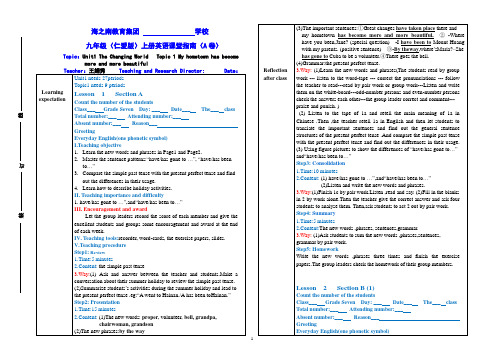
海之南教育集团 学校九年级(仁爱版)上册英语课堂指南(A 卷)Topic :Unit1 The Changing World Topic 1 My hometown has becomemore and more beautifulTeacher :王娟秀 Teaching and Research Director: Date :Learning expectationUnit1 needs 27periods Topic1 needs 9 periods Lesson 1 Section A Count the number of the studentsClass ___ Grade Seven Day: ___ Date ___ The ___ classTotal number:___ Attending number:___Absent number:___ Reason ___GreetingEveryday English(one phonetic symbol)I.Teaching objective1. Learn the new words and phrases in Page1 and Page2.2. Master the sentence patterns:“have/has gone to …”, “have/has beento …”3. Compare the simple past tense with the present perfect tense and findout the differences in their usage.4. Learn how to describe holiday activities.II. Teaching importance and difficulty1. have/has gone to …”,and “have/has been to …”III. Encouragement and awardLet the group leaders record the score of each member and give theexcellent students and groups some encouragement and award at the endof each week.IV. Teaching tools:recorder, word-cards, the exercise papers, slides.V.Teaching procedureStep1: Review1.Time:5 minutes2.Content: the simple past tense3.Way:(1) Ask and answer between the teacher and students.Make aconversation about their summer holiday to review the simple past tense.(2)Summarize students ’s activities during the summer holiday and lead tothe present perfect tense .eg:“A went to Hainan./A has been toHainan.”Step2: Presentation1.Time:15 minutes2.Content: (1)The new words: proper , volunteer, bell, grandpa,chairwoman, grandson(2)The new phrases:by the wayReflection after class(3)The important sentences:①Great changes have taken place there and my hometown has become more and more beautiful. ② -Where have you been,Jane? (special question) -I have been to Mount Huang with my parents. (positive sentence) ③-By theway ,where ’sMaria?–She has gone to Cuba to be a volunteer.④There goes the bell. (4)Grammar:the present perfect tense.3.Way: (1)Learn the new words and phrases(The students read by group work --- listen to the word-tape --- correct the pronunciations --- follow the teacher to read---read by pair work or group work---Listen and write them on the white-board---odd-number persons and even-number persons check the answers each other---the group leader correct and comment--- praise and punish. )(2) Listen to the tape of 1a and retell the main meaning of 1a in Chinese .Then ,the teacher retell 1a in English and then let students to translate the important sentences and find out the general sentence structures of the present perfect tense .And compare the simple past tensewith the present perfect tense and find out the differences in their usage. (3) Using figure pictures to show the differences of “have/has gone to …” and “have/has been to …” Step3: Consolidation 1.Time:10 minutes2.Content: (1) have/has gone to …”,and “have/has been to …”(2)Listen and write the new words and phrases.3.Way:(1)Finish 1c by pair work.Listen ,read and say. (2)Fill in the blanks in 2 by work alone.Then the teacher give the correct answer and ask four students to analyse them. Then,ask students to act 2 out by pair work. Step4: Summary 1.Time:5 minutes2.Content:The new words ,phrases, sentences,grammar.3.Way: (1)Ask students to sum the new words ,phrases,sentences, grammar by pair work. Step5: HomeworkWrite the new words ,phrases three times and finish the exercise papers.The group leaders check the homework of their group members.Lesson 2 Section B (1)Count the number of the studentsClass ___ Grade Seven Day: ___ Date ___ The ___ class Total number:___ Attending number:___Absent number:___ Reason ___ GreetingEveryday English(one phonetic symbol)装订线I.Teaching objective1. Learn the new words and phrases in Page3 and part ones in Page4.2. Go on learning the usage of the present perfect tenseII. Teaching importance and difficulty1.past participle2.-Have/Has +sb+pp.+…?-Yes ,sb.have/has.-No, sb.haven’t/hasn’t. ”III. Encouragement and awardLet the group leaders record the score of each member and give the excellent students and groups some encouragement and award at the end of each week.IV. Teaching tools:recorder, word-cards, the exercise papers, slides.V.Teaching procedureStep1: Review1.Time:5 minutes2.Content: (1)The present perfect tense (2)The important words and phrases learnt last lesson.3.Way:(1) Check the work after class. (2)Review The present perfect tense.(3) dictation.Step2: Presentation1.Time:15 minutes2.Content: (1)The new words: disabled, ever, shut, rope, online, teenager, granny, describe(2)The new phrases:in detail(3)The important sentences:①Have you cleaned rooms for the disabled for the disabled children?(general question) –Yes, I have.②-Have you ever fed them? –No, I haven’t. But I have cooked for them. ③-ThoughI had no time to travel, I still felt very happy.(4)Grammar:the present perfect tense.3.Way: (1)Learn the new words and phrases(The students read by group work --- listen to the word-tape --- correct the pronunciations --- follow the teacher to read---read by pair work or group work---Listen and write them on the white-board---odd-number persons and even-number persons check the answers each other---the group leader correct and comment--- praise and punish. )(2) Show some pictures of disabled children.Make a dialogue with students to know whether they have helped disabled children and lead to 1a.(3) Listen to the tape of 1a and retell the main meaning of 1a in Chinese .Then ,the teacher retell 1a in English and then let students to translate the important sentences and find out the general sentence structures of the present perfect tense . (4) Analyse the important sentences and then practise orally.Step3:Consolidation1.Time:10 minutes2.Content: (1)Review past tense and past participle of verbs .(2)Practise general questions of the present perfect tense in1b3.Way:(1) Review past tense and past participle of verbs by work alone and then, ask several students to sum up the rules. (2) Practise general questions of the present perfect tense in1b by pair work orally and ask some pairs to PK.Step4: Summary1.Time:5 minutes2.Content:The new words ,phrases, sentences,grammar.3.Way:①Ask students to sum the new words ,phrases,sentences, grammar by pair work.Step5: HomeworkWrite the new words ,phrases three times and finish the exercise papers.The group leaders check the homework of their group members. Lesson 3 Section B (2)Count the number of the studentsClass___ Grade Seven Day: ___ Date___ The___ class Total number:___ Attending number:___Absent number:___ Reason___GreetingEveryday English(one phonetic symbol)I.Teaching objective1. Learn the new words and phrase left in Page4.2. Go on learning the usage of the present perfect tense3. Compare the teenagers’ life in the past with that nowadays and lead students to cherish the happy life at present.II. Teaching importance and difficulty1. The new words and phrase2.The present perfect tense.III. Encouragement and awardLet the group leaders record the score of each member and give the excellent students and groups some encouragement and award at the end of each week.IV. Teaching tools:recorder, word-cards, the exercise papers, slides.V.Teaching procedureStep1: Review1.Time:5 minutes2.Content: (1)The present perfect tense. (2)The important words andTeacher’s workis finished. phrases learnt last lesson.3.Way:(1) Check the work after class.(2)Review the present perfect tense (3) dictation.Step2: Presentation1.Time:15 minutes2.Content: (1)The new words: education, childhood, support, laborer,develope, rapidly, luckily, development.(afford)(2)The phrases: a hard life ,in order to ,give support to, a good education,day and night(3)The important sentences:①Can you describe it in detail. ②Parentscouldn’t afford an education for their children. ③In order to help supporttheir families, they had to be child labores. ④Now our country hasdeveloped rapidly.⑤The government gives support to poor families, sochildren can get a good education.(4)Grammar:The present perfect tense.3.Way: (1)Learn the new words and phrases(The students read by groupwork --- listen to the word-tape --- correct the pronunciations --- followthe teacher to read---read by pair work or group work---Listen and writethem on the white-board---odd-number persons and even-number personscheck the answers each other---the group leader correct and comment---praise and punish. )(2) Show some pictures of the life of teenagers in the past. Make adialogue with students to talk about the differences between the life ofteenagers in the past and nowdays lead to 2a.(3) Listen to the tape of 2a and retell the main meaning of 2a inChinese .Then ,the teacher retell 2a in English and then let students totranslate the important sentences and find out the general sentencestructures of the present perfect tense . (4) Analyse the importantsentences and then practise orally.Step3:Consolidation1.Time:10 minutes2.Content: (1)Review past tense and past participle of verbs .(2)Practise general questions of the present perfect tense in1b3.Way:(1) Review past tense and past participle of verbs by work aloneand then, ask several students to sum up the rules. (2) Practise generalquestions of the present perfect tense in1b by pair work orally and asksome pairs to PK.Step4: Summary1.Time:5 minutes2.Content:The new words ,phrases, sentences,grammar.3.Way:①Ask students to sum the new words ,phrases,sentences,grammar by pair work.Step5: HomeworkWrite the new words ,phrases three times and finish the exercisepapers.The group leaders check the homework of their group members.Lesson 4 Section C (1)Count the number of the studentsClass___ Grade Seven Day: ___ Date___ The___ classTotal number:___ Attending number:___Absent number:___ Reason___GreetingEveryday English(one phonetic symbol)I.Teaching objective1. Learn the new words and phrase in Page5 and Page6.II. Teaching importance and difficultyThe usage of the new words and phrase.III. Encouragement and awardLet the group leaders record the score of each member and give theexcellent students and groups some encouragement and award at the endof each week.IV. Teaching tools:recorder, word-cards, the exercise papers, slides.V.Teaching procedureStep1: Review1.Time:5 minutes2.Content: (1)The present perfect tense.(2)The important words andphrases in Page4.3.Way:(1) Check the work after class. (2)Review The present perfecttense (3) dictation.Step2: Presentation1.Time:15 minutes2.Content: (1)The new words: narrow,communication, quick, leisure,relative, mainly, telegram,sort,fax,rapid,progress,already,succeed.(2)The phrases: keep in touch with ,far away ,reform andopening-up,make progress.(ring roads,living conditions)3.Way: (1) Show some pictures of Beijing in the past and at present andask the students to discuss the differences between them lead to the newwords and phrases in 1a.(2)Learn the new words and phrases(The students read by group work ---listen to the word-tape --- correct the pronunciations --- follow the teacherto read---read by pair work or group work---Listen and write them on thewhite-board---odd-number persons and even-number persons check theanswers each other---the group leader correct and comment---praise and punish. )Step3:Consolidation1.Time:15 minutes2.Content: (1)The new words and phrases.3.Way:(1) Practise how to use the new words and phrases by doing the exercise papers. (2) Give the standard answers and ask several students to analyse the questions in their paper.(3) The group leaders correct and supplement some opionions.(4)The teacher comment.Step5: HomeworkWrite the new words ,phrases three times and finish the exercises in the workbooks.The group leaders check the homework of their group members.Lesson 5 Section C (2)Count the number of the studentsClass___ Grade Seven Day: ___ Date___ The___ class Total number:___ Attending number:___Absent number:___ Reason___GreetingEveryday English(one phonetic symbol)I.Teaching objective1.Go on learning the usage of the present perfect tense3. Compare the past Beijing with the present Beijing and learn the great changes in China.4.Inspire students to cherish the happy life at present and to cultivate their patriotism.II. Teaching importance and difficulty1. The present perfect tense.2. Some sentences.III. Encouragement and awardLet the group leaders record the score of each member and give the excellent students and groups some encouragement and award at the end of each week.IV. Teaching tools:recorder, the exercise papers, pictures.V.Teaching procedureStep1: Review1.Time:5 minutes2.Content: (1)The present perfect tense. (2)The words and phrases learnt last lesson.3.Way:(1) Check the work after class.(2)Review the present perfect tense (3) dictation.Step2: Presentation1.Time:15 minutes2.Content:(1)The important sentences:①My granny has lived in Beijing for more than forty yeas.②People kept in touch with their friends and relatives far away mainly by letter or telegram. ③Beijing has made rapid progress and it has already succeeded in hosting the 2008 Olympic Games.3.Way: (1)Let the students look at the pictures in 1a and disscuss the differences in English using the simple past tense and the present perfect tense. (2) Listen to the tape of 1a and retell the main meaning of 1a in Chinese .Then ,the teacher retell 2a in English and then let students to translate the important sentences analyse the important sentences and then practise orally. (3) Let students finish 1b by work alone.Then,check the answers.Step3:Consolidation1.Time:10 minutes2.Content: (1)The important sentences and the present perfect tense.3.Way:(1) Fnish 1c by pair work.Step4: Extension1.Time:5 minutes2.Content: The changes in our hometown.3.Way:①Discuss the changes in our hometown by group work.Step5: HomeworkWrite the important sentences and finish the exercise papers.The group leaders check the homework of their group members.Lesson 6 Section DCount the number of the studentsClass___ Grade Seven Day: ___ Date___ The___ class Total number:___ Attending number:___Absent number:___ Reason___GreetingEveryday English(one phonetic symbol)I.Teaching objective(1)The new words:organization,composition,note,consider, tool. (2)Thephrases: draw up, thanks to (3)Review and sum up the importantwords, phrases,sentences and the present perfect tenseII. Teaching importance and difficulty1.The dictation and usage of the important words,phrases,sentences and the present perfect tenseIII. Encouragement and awardLet the group leaders record the score of each member and give the excellent students and groups some encouragement and award.IV. Teaching tools: word-cards.V.Teaching procedureStep1: Learn new words and phrases1.Time:10 minutes2.Content:The new words:organization, composition, note, consider, tool.(2)The phrases: draw up, thanks to3.Way: (1)Learn the new words and phrases(The students read by group work --- listen to the word-tape --- correct the pronunciations --- follow the teacher to read---read by pair work or group work---Listen and write them on the white-board---odd-number persons and even-number persons check the answers each other---the group leader correct and comment--- praise and punish. )Step2: Review1.Time:15 minutes2.Content: (1) the important words,phrases,sentences and the present perfect tense3.Way:(1) ①Divide the students into four groups.Then,let the students go to the white-board to write down the important words or phrases or sentences or grammars.②The group leaders record the results and hand them in.Step3: Comment and supplement.1.Time:10 minutes3.Way: (1)The teacher comment the students’show and supplement some points.(2) Give the groups and persons praise and award that are of the first three places.Lesson 7 (Composition)Count the number of the studentsClass___ Grade Seven Day: ___ Date:___ The___ class Total number:___ Attending number:___Absent number:___ Reason___GreetingEveryday English(one phonetic symbol)I.Teaching objectiveLearn the basic steps of writing a composition.II. Teaching importance and difficulty1.How to write a composition to the pictures.III. Encouragement and award(1)Praise students writes well point out the advantages and disadvantages of the students’ compositions.IV.Teaching procedureStep1 Discussion1.Time:10 minutes2.Content:The basic steps of writing a composition3.Way: (1)Discuss how to write the composition in 4 of Section D. (2)The teacher sum up the basic steps.Step2 Writing1.Time:20 minutes2.Content: (1) A composition about the changes in Li Ming’s hometown according to the pictures in 4.3.Way:(1) Write a composition by work alone. (2) Read over and give remarks by pair work..Step3 Comment1.Time:10 minutes2.Content:The compositions of each students.3.Way: (1)The group leaders skim through their members’compositions and remarks and sum up the advantages and disadvantages and pink out the best compositions to give them to the teacher .(2 Let two students to read two best compositions and let all the students to find out the advantages and disadvantages and discuss how to revise the disadvantages.(3)The teacher comments,summarizes and praise.Lesson 8 (practice)Count the number of the studentsClass___ Grade Seven Day: ___ Date:___ The___ class Total number:___ Attending number:___Absent number:___ Reason___GreetingEveryday English(one phonetic symbol)I.Teaching objectivePractice and consolidate the important knowledge in Topic1 of Unit 1.II.Teaching procedureStep1 the students finish Paper B1.Time:40 minutes2.Content:Paper B3.Way: Finish Paper B at one lesson .Lesson 9 (The assessment of Paper B)Count the number of the studentsClass___ Grade Seven Day: ___ Date:___ The___ class Total number:___ Attending number:___Absent number:___ Reason___GreetingEveryday English(one phonetic symbol)I.Teaching objectivePractice and consolidate the important knowledge in Topic1 of Unit 1.II.Encouragement and award:Praise the persons and groups which do well .III.Teaching procedureStep1Check Paper B1.Time:10 minutes2.Content:Paper B3.Way: Check Paper B by pair work,Then, the group leaders sum up the problems which are done badly.Step2 Analyse and assess Paper B1..Content:Paper B2..Way: (1)Analyse and assess it by some students and then the group leaders.(2)The teacher gives them some help if there is need.(3) The teacher comments and praise the persons and groups which do well .。
仁爱英语九年级unit1topic1学案教案

Unit1 Topic 1一、知识目标【重要短语】have a good summer holiday 过愉快的暑假come back from…从……回来work for …为……工作feel sorry for…对……深表同情a disabled children’s home残疾儿童养育院the whole holiday 整个假期tell stories to kids 给小孩讲故事learn…from 从……当中学习feed a child 喂小孩do farm work 干农活go to summer classes 上暑期班write an article about…写篇有关…的文章have a hard life 过着艰苦的的生活in the past/ future 在过去/ 在将来in detail 详细地at sunrise 在日出时have no chance to do sth. 没有机会做某事afford ( to do) sth 担负得起(做)某事give support to sb. 给某人帮助/支持get a good education 获得良好的教育search…for…为了……搜索……have little food to eat 吃不饱dress warmly 穿得暖with the development of…随着……的发展have a balanced diet 饮食均衡play musical instruments 演奏乐器sleep in the open air 在户外睡觉study/ go abroad 在国外学习/ 出国win/ lose a competition 赢得/ 输掉比赛enjoy Beijing Opera 欣赏京剧used to do sth. 过去常做某事at sunrise 在日出时go hungry 变饿了fall ill 得病/ 患病divide …into…把……分成……feel satisfied with…对……感到满足see …. oneself 亲眼看见……make progress 取得进步thanks to 多亏; 幸亏;由于stand for 代表with the help of…在……的帮助下draw up an outline 拟定提纲【重点句型】have just come back from your hometown. 你刚刚从你的家乡返回。
仁爱英语九年级上-unit1-topic2导学案

仁爱英语九年级上-u n i t1-t o p i c2导学案(总5页)--本页仅作为文档封面,使用时请直接删除即可----内页可以根据需求调整合适字体及大小--Unit 1 topic2根据汉语或首字母提示完成句子1.The little boy is crying, because he has got_l_______and can't find the way home.2. India has a _p________of more than 1 billion.3.Our country carried out one-child p_____successfully.4.I can learn English better now_____ ______(因为)his help.5.Miss Gao is p______in her room. Look! The light in her room is on.6.Miss Wan has been to some_______(欧洲)countries before.单项选择()1. ---Have you returned the library book_____---Yes, I've______returned it.A. already, already B yet, yet C yet, just D just, already()2. The population of China .A isB areC hasD have()3. _____seemed that they got lost there.A ThatB HeC ItD This()4. Will the population of the be ______than that of China in the future?A moreB largerC fewerD smaller() was late for the meeting. ------_______________A So I wasB So was IC So I didD So did I()6. The birthday party _____two weeks ago.A took placeB happenedC has taken placeD was happened()7. I have just phoned Mr. Black. But nobody answered the phone. I_____ten minutes later.A call up himB will give him a ringC phoned himD calls him up()8. Miss Gao is strict_____us_____our homework.A in withB with onC with inD of with()9. ---Ican't understand the meaning of theA Neither can IB So can IC So I canD Neither I can()10. Our school has changed______in _______years.A great , recentlyB greatly , recentC greatly , recentlyD great ,recent 从B栏中选出与A栏相对应的答语A B()1. Have you ever been to New York A. So it did.()2. I haven't finished my homework. B. A car hit her()3. What happened to her yesterday C. Neither have I() you found your purse yet D. Yes, I have already found it.() has a population of billion at that time. E. NeverSection B根据汉语或首字母提示完成句子1.The i__________population has become one of the most serious challenges in the world.2.He had a traffic accident. L_________, he wasn't hurt badly.3.It is necessary fir us to _____ ______(执行)this plan at once.4.Our country is still a ____________ _______(发展中国家).5.Do you know the r________situation of Jane I lost touch with her.单项选择()1.——_______is the population of Indonesia -----223million.A How muchB How manyC WhatD How() population of the city has increased______twelve million.A toB forC byD on() bridge is ______meters long.A nine thousand , eight hundreds and forty-eightB nine thousands , eight hundred and forty-eightC nine thousands , eight hundreds and forty-eightD nine thousand , eight hundred and forty-eight()4. There are ______students in our school.A three thousandsB three thousands ofC three thousand ofD three thousand() is a country ____a population of 184 million.A andB withC hasD have() there anything interesting______today's newspaper?A onB ofC inD with() population has increased______15percent.A toB intoC byD on() weather in China is different from ____in Australia.A thatB oneC itD /补全对话A: Excuse me, could I ask you some questions?B; Certainly.A; What's the population ___1__the world?B; It's aboutA;Which country has the ___3___population?. Of course.about India?population of India is___4___than that of China. India is the country with the____5___largest population in the world.A. I see. Thank you.1_________2_________3___________4___________5__________Section C根据汉语或首字母提示完成句子1._____ ______(迄今为止), no one has broken his record.2.What problems will playing with fire__________(导致)3.We may meet many d______, but we are sure we can overcome them.4.We will______stronger____________ ______(采取措施)protect our homes.5.The number of the students in our school this year has increased by 20p______.单项选择( )1. Edison was known_____a great inventor.A forB asC inD on( )'t worry. We aren't _____food.A for shortB short forC short ofD in short( ) Mei____the maths problems all by herself.A works outB worksC works inD works on( ) you know ______of the students in our class hate maths?A two threeB two thirdsC two thirdD second two( )5. The new policy has _____improving our environment.A been good atB done well inC been weak inD worked well in阅读理解A very important world problem is the growing population on the earth. The population of the world today is more than 6 500 000 is a great number and we know it quite well. The important thing is not how large the population of the world is now, but the rate of its growth------it is about percent every year.Every second, four babies are born in the world. Another baby! Another baby! You can not even speak quickly enough to keep up with the birth rate.The population is growing larger and larger. So it goes on,hour after hour. In one day, people have to find food for over 350 000mouths.This great growing population will make a big problem by the year 2014------there will be as many as 7 billion people on the earth. So this is one of the biggest problems which you are going to see in your life.( ) of the important problems today is ______according to the passage.A the number of the dead peopleB the heavy trafficC the growing populationD the food shortage( ) population of the world is increasing by _____every year.A 350 000B one fifthC percentD 20 percent( )3. What's the meaning of the word "rate" in the passage in Chinese?A 人口B 速度C 数量D 大小( ) the passage, we know there are about____new babies to be born in an hour.A 240B 350 000C 14 400D 48( ) is the following is NOT true?AThe population on the earth is very large.B The large population may be good for the world.C The growing population will be a big problem in our life.Section D根据汉语或首字母提示完成句子1.It's quite an old bike, but in e________conditions.2.All our friends and r_______came to our wedding.3.We went there______ ______ ______ _______ ______(几年前)4.It costs ____ ______50 dollars to fly to Rome.5.We are trying to _____ ____ _____(跟上)what's happening.单项选择()1. ----Have you seen the film____ ----Yes. I saw it 3years_____.A ago, beforeB before, agoC ago, agoD before, bofere( )2. Don't touch anything______your teacher tells you to.A ifB thoughC unlessD even though( )3. A _____of days ago he bought a _____of trousers.A couple ,pairB pair, coupleC couples, pairD pair, pair( ),______you_______your ticket ------Not yet.A did ,findB have ,foundC has ,foundD do, find( ) school ______the boys______High School.A do, belongB are,belongingC do,belong toD are,belonging to选择适当的副词填空never ever yet already just1.----Has your English teacher come____ ----Yes,she has____been here for half an hour.2.----How many times have you been to Hainan?-----Twice. I've_____come back from here.3. Every evening when I got home,my mother has ______cooked supper for me.you _______seen the film Harry Potter ------No, not_____.have ______been to America. I really hope I can go there to visit Disneyland one day.用所给单词的适当形式填空as , happen , enough, grow, duty, to, fast, only, many, ever Boys and girls, we are always told that population is the largest challenge in the world today. But have you ___1__though about it Have you thought what it means Have you thought what we should do ___2____studentsSome students say that more people can do __3___things. Forexample,when droughts___4___,more people can do better than fewer people can. Other students think that human beings have__5___one earth,and they have to live with many other living things. So,we must keep the balance of the nature.The resources on the earth such as food,water,coal and so on are not as__6___as they were twenty years ago. Why Because the world's population is increasing so __7____! In order to have better living conditions and environment,we must make a contribution to slowing down the rate of population __8___. That's our__9___. We must try our best to make everyone pay attention____10__the so and we are we can do better.1________2_______3__________4________5___________6________7_______8__________9________10__________。
仁爱版九年级英语上册Unit1 Topic 2复习教案

----about 1.1billion.
A. How many are; They are
B. How much is ; That is
C. What is ; It is
D. How is; This is
4. ---Which country has the
population, India,
仁爱版英语九年级上册
.
基于“课程标准、中招视野பைடு நூலகம்两类结构”
九年级 Unit1 Topic2 教案设计
(复习课)
一、 复习目标确定的依据: 1、课程标准相关要求:《英语课程标准》(2011 年版)要求学生能够理解并掌握 1600 单词。中考范围内的知识点要求。 2、教材分析: 本话题继续学习现在完成时的用法,其中 just, already, yet , ever, never 常令学生 感到困惑,在考试中常常失误。So +助动词+主语及 so +主语+助动词。也是学生 易弄混的问题
如果没有您爱的滋润,怎么会绽放那么多美好的灵魂之花!
仁爱版英语九年级上册
题的 词汇。
目标 2: 能够掌 握文中 出现的 生词及 重点短 语及句 型
复习指导一:
复习内容:page9 至 page16 的内容。
复习方法:独立复习,讨论。
复习时间:10 分钟
复习要求:重点掌握与背诵文中的重点短语
及句型。 .
America or China?
----American
A. largest
B. smallest
C. least
D. fewest
5. ----How many workers are there in your company?
仁爱版英语九年级上册9A_Unit1_Topic2_SectionA_精品学案
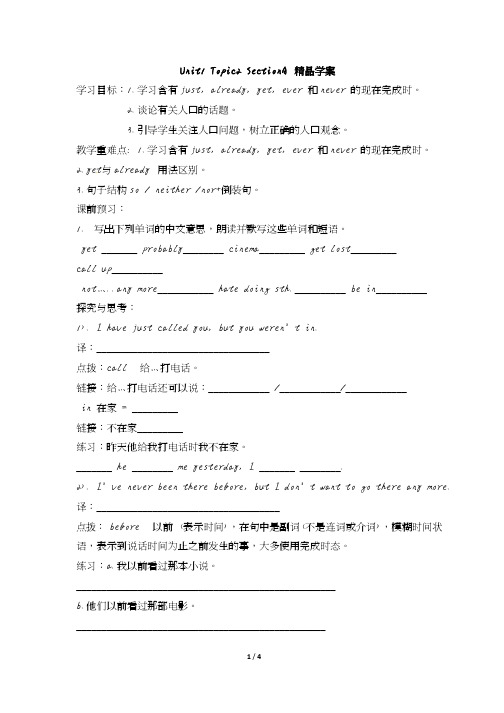
Unit1 Topic2 SectionA 精品学案学习目标:1.学习含有just, already, yet, ever 和never 的现在完成时。
2.谈论有关人口的话题。
3.引导学生关注人口问题,树立正确的人口观念。
教学重难点: 1.学习含有just, already, yet, ever 和never 的现在完成时。
2.yet与already 用法区别。
3.句子结构so / neither /nor+倒装句。
课前预习:1. 写出下列单词的中文意思,朗读并默写这些单词和短语。
yet _______ probably________ cinema_________ get lost_________call up__________not…..any more___________ hate doing sth.__________ be in__________探究与思考:1). I have just called you, but you weren’t in.译:__________________________________点拨:call 给…打电话。
链接:给…打电话还可以说:____________ /____________/____________in 在家= _________链接:不在家_________练习:昨天他给我打电话时我不在家。
_______ he ________ me yesterday, I _______ ________.2). I’ve never been there before, but I don’t want to go there any more. 译:____________________________________点拨:before 以前(表示时间),在句中是副词(不是连词或介词),模糊时间状语,表示到说话时间为止之前发生的事,大多使用完成时态。
最新推荐仁爱版九年级英语上册Unit1_Topic1学案
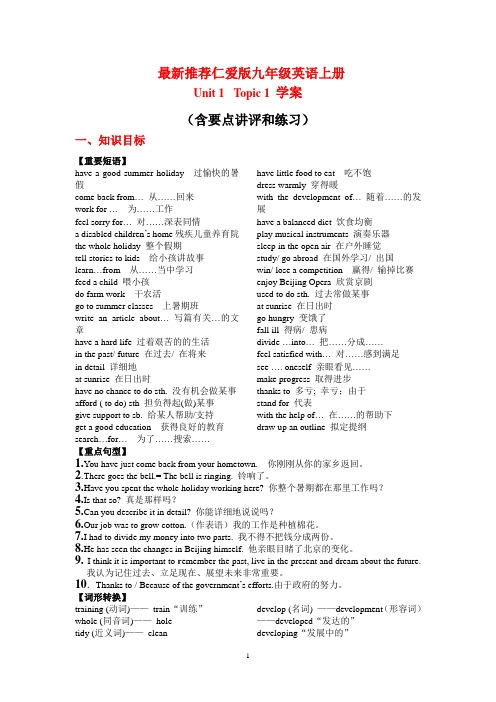
最新推荐仁爱版九年级英语上册Unit 1Topic 1 学案(含要点讲评和练习)一、知识目标【重要短语】have a good summer holiday 过愉快的暑假come back from…从……回来work for …为……工作feel sorry for…对……深表同情a disabled children’s home残疾儿童养育院the whole holiday 整个假期tell stories to kids 给小孩讲故事learn…from 从……当中学习feed a child 喂小孩do farm work 干农活go to summer classes 上暑期班write an article about…写篇有关…的文章have a hard life 过着艰苦的的生活in the past/ future 在过去/ 在将来in detail 详细地at sunrise 在日出时have no chance to do sth. 没有机会做某事afford ( to do) sth 担负得起(做)某事give support to sb. 给某人帮助/支持get a good education 获得良好的教育search…for…为了……搜索……have little food to eat 吃不饱dress warmly 穿得暖with the development of…随着……的发展have a balanced diet 饮食均衡play musical instruments 演奏乐器sleep in the open air 在户外睡觉study/ go abroad 在国外学习/ 出国win/ lose a competition 赢得/ 输掉比赛enjoy Beijing Opera 欣赏京剧used to do sth. 过去常做某事at sunrise 在日出时go hungry 变饿了fall ill 得病/ 患病divide …into…把……分成……feel satisfied with…对……感到满足see …. oneself 亲眼看见……make progress 取得进步thanks to 多亏; 幸亏;由于stand for 代表with the help of…在……的帮助下draw up an outline 拟定提纲【重点句型】1.You have just come back from your hometown. 你刚刚从你的家乡返回。
仁爱版九年级英语上册Unit1TheChangingWorldTopic2SectionA教案

T: Do Michael
and Maria like going to the
shopping centre?
S1...
S2: No, I haven
’t. yet/Not.
教 依据不一样地理地点,
⋯
work
before
listening. Then listen and check
and check the answer while
the answer. Finish 2.
listening.
T: Well done. Steve has been to China for a
few days. Now tick the places Steve has
指引学生关注社会现象,关注人口问题。
精选资料
4. Culture awareness: ( optional)
Ⅲ. The key points and difficult points
1. Key points:
Words and phrases: yet, probably, cinema, department, nearby
理。
(2-3 mins)
activity
the structure
of
present
quickly as possible.
精选资料
(1) A:you(make) yourperfect tense.
bed?
B: Yes.
(2)
I
(water) the flowers
already.
仁爱版九年级英语导学案上册unit1topic2sectionD
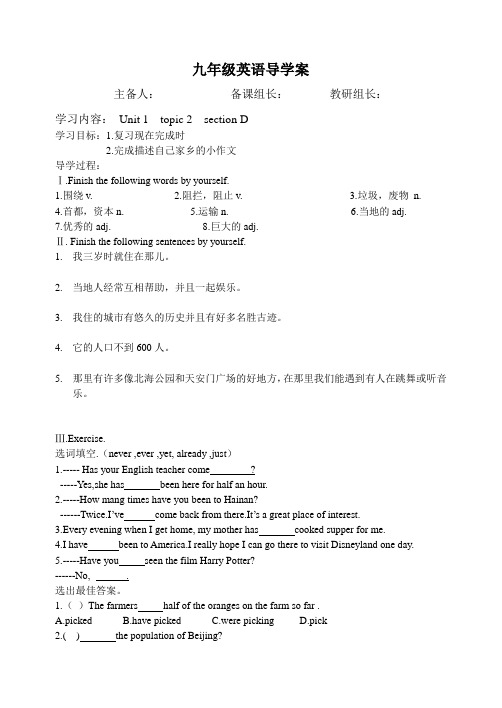
九年级英语导学案主备人:备课组长:教研组长:学习内容:Unit 1 topic 2 section D学习目标:1.复习现在完成时2.完成描述自己家乡的小作文导学过程:Ⅰ.Finish the following words by yourself.1.围绕v.2.阻拦,阻止v.3.垃圾,废物n.4.首都,资本n.5.运输n.6.当地的adj.7.优秀的adj. 8.巨大的adj.Ⅱ. Finish the following sentences by yourself.1.我三岁时就住在那儿。
2.当地人经常互相帮助,并且一起娱乐。
3.我住的城市有悠久的历史并且有好多名胜古迹。
4.它的人口不到600人。
5.那里有许多像北海公园和天安门广场的好地方,在那里我们能遇到有人在跳舞或听音乐。
Ⅲ.Exercise.选词填空.(never ,ever ,yet, already ,just)1.----- Has your English teacher come ?-----Yes,she has been here for half an hour.2.-----How mang times have you been to Hainan?------Twice.I’ve come back from there.It’s a great place of interest.3.Every evening when I get home, my mother has cooked supper for me.4.I have been to America.I really hope I can go there to visit Disneyland one day.5.-----Have you seen the film Harry Potter?------No, .选出最佳答案。
1.()The farmers half of the oranges on the farm so far .A.pickedB.have pickedC.were pickingD.pick2.( ) the population of Beijing?A.How many isB.What’sC.How much isD.What’s the number3.There are over students in our school.And of them are boys.A.four hundred , three fifthB. four hundreds , three fifthC. four hundred , three fifthsD. four hundreds , three fifths4.They had to stay in the classroom after class the bad weather yesterday.A.thanks toB.thanks forC.becauseD.because of5.The population of France is nearly as as that of Britain.A.fewerrgeC.moreD.many6.----She liked playing football when she was young. ----A.So her brother was .B. So was her brother.C.So did her brother.D. So her brother did.7.Be careful the tea !It’s too hot.A.toB.atC.forD.with8.The temperature in the daytime is higher than at night.A.itB. oneC.thatD.those9.I’ve visited the West Lake .I visited it two years .A.ago ,agoB.before, beforeC.ago,beforeD.before ,ago10.-----What do you think of the English opera?----- I’ve never seen a better one.A.BoringB.ExcellentC.TerribleD.Scary.写作。
仁爱英语九年级上unit 1 topic 2 Section C 学案
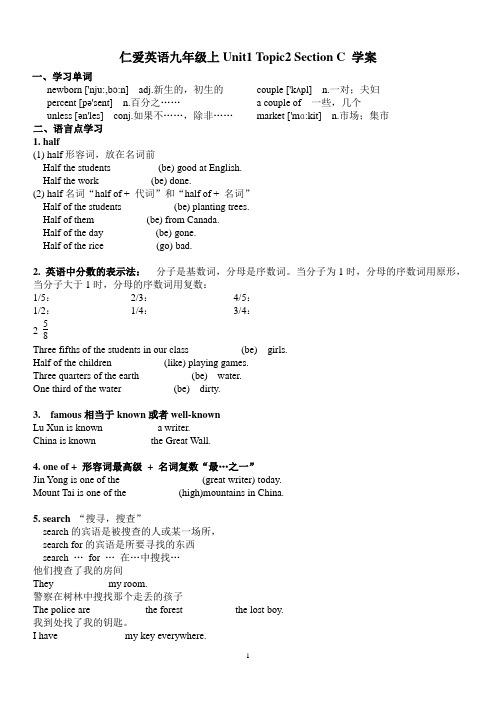
仁爱英语九年级上Unit1 Topic2 Section C 学案一、学习单词newborn ['nju:,bɔ:n] adj.新生的,初生的percent [pə'sent] n.百分之……unless [ən'les] conj.如果不……,除非……couple ['kʌpl] n.一对;夫妇a couple of 一些,几个market ['mɑ:kit] n.市场;集市二、语言点学习1. half(1) half形容词,放在名词前Half the students _________(be) good at English.Half the work __________(be) done.(2) half名词“half of + 代词”和“half of + 名词”Half of the students __________(be) planting trees.Half of them __________(be) from Canada.Half of the day __________(be) gone.Half of the rice __________(go) bad.2. 英语中分数的表示法:分子是基数词,分母是序数词。
当分子为1时,分母的序数词用原形,当分子大于1时,分母的序数词用复数:1/5:__________ 2/3:__________ 4/5:__________1/2:__________ 1/4:__________ 3/4:__________2 58__________Three fifths of the students in our class __________(be) girls. Half of the children __________(like) playing games.Three quarters of the earth __________(be) water.One third of the water __________(be) dirty.3. famous相当于known或者well-knownLu Xun is known __________ a writer.China is known __________ the Great Wall.4. one of + 形容词最高级+ 名词复数“最…之一”Jin Yong is one of the ________________(great writer) today. Mount Tai is one of the __________(high)mountains in China.5. search“搜寻,搜查”search的宾语是被搜查的人或某一场所,search for的宾语是所要寻找的东西search …for …在…中搜找…他们搜查了我的房间They __________ my room.警察在树林中搜找那个走丢的孩子The police are __________ the forest __________the lost boy. 我到处找了我的钥匙。
仁爱英语九年级上Unit1_Topic1_ABCD学案

课题:九年级英语上册 Unit1 Topic1 ABCD学案Section AUnit 1主备人:王玉刚审核:英语组时间: 8.20 课型:新授【教学目标】:掌握现在完成时态的,结构,概念。
以及have或has been to 与have或has gone to 的用法区别。
【教学重点】:掌握现在完成时态的用法,以及结构,概念【教学难点】:区别have或has been to 与have或has gone to 的用法区别。
【预习过程】1.变化的世界________________________________2.长假过后__________________________________3.度过一个愉快的暑假________________________4.从…回来__________________________________5.巨大的变化________________6.发生____________7.越来越漂亮________________________________8.如此(那么)多的人___________________________9.一个合适的地方_______________10.拍照________11.提高我的英语水平__________________________12.顺便问一下__________13.根据1a的内容________14.孩子们的假期经历__________________________15.查出…和…的不同__________________________16.填空____________________17.感觉舒服________ 18.患感冒_____________19.很长时间_____________三. 语法重点导入--- (根据句意在横线上填入谓语动词的适当形式)1. He ______________ (play) soccer on the playground now.2. He ______________ (play) soccer on the playground yesterday.3. He ______________ (play) soccer on the playground when I saw him yesterday.4. He ______________ (play) soccer on the playground every day.5. He ______________ (play) soccer on the playground tomorrow afternoon.6. He ______________ (play) soccer on the playground for a long time.注意(6)句中的时间状语,看P118现在完成时讲解, 总结现在完成时用法总结:(1) 现在完成时中谓语动词的形式是---________________________ 看P140-142过去分词表,做P3---1b(2) 经常搭配的时间副词有: just, already, yet, ever, never, before…(3) 现在完成时句型转换写出(6)句的否定句:___________________________________________________________________写出(6)句的一般疑问句并肯定回答:_____________________________________________________写出(6)句的划线提问句:_______________________________________________________________写出(6)句的反意疑问句:_______________________(4) 观察1a中出现的现在完成时的句子并翻译理解1. You have just come back from your hometown. 译:____________________________________2. Great changes have taken place there. 译:______________________________________________3. My hometown has become more and more beautiful. 译:_____________________________________________4. Where have you been? I have been to Mount Huang with my parents. 译:________________________________5. Where’s Maria? She has gone to Cuba to be a volunteer. 译:__________________________(5) 现在完成时考点:have / has been to --- have / has gone to练习:参看P118现在完成时讲解,完成P2(2)区别:have / has been to表示曾经______________,现在_____________;have / has gone to表示已经______________,现在______________.【习题巩固】四.在文中划出下面的句子并分析1. Great changes have taken place there. 注意:taken是take的______________形式点拨:change有名词/动词两种词性,名词词意是_________/__________等; 动词词意是_________take place --- 发生、举办,指非偶然性事件的“发生”,即这种事件的发生一定有某种原因或事先的安排区别:happen --- 发生、碰巧,一般用于偶然或突发性事件注意:take the place of…--- 取代某人的位置练习:a. Jason ___________________________ Miss Li to teach us French next term.b. The Olympic Games of 2008 ________________________ successfully in Beijing.c. What ___________________________ to you yesterday?2. But there were so many people that I couldn’t find a proper place to take photos.思考:so…that…意思是__________,引导_______状语从句区别:so that…意思是_______,引导_______状语从句练习: a.为了拍照,他爬得很高。
仁爱版九年级英语教学设计新部编版Unit1Topic1
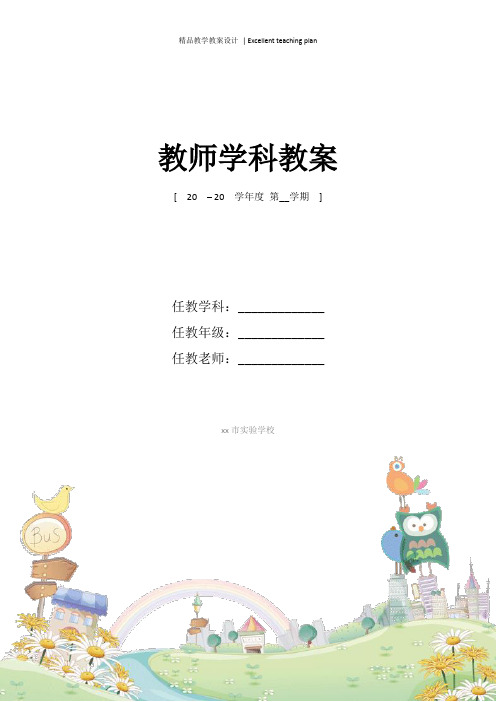
教师学科教案[ 20 – 20 学年度第__学期]任教学科:_____________任教年级:_____________任教老师:_____________xx市实验学校Unit 1 The Changing WorldTopic1 My hometown has become more and morebeautiful.Section AThe main activity is 1a. 本课重点活动是1a。
Ⅰ. Teaching aims and demands 教学目标1. Learn some new words and a phrase:proper, by the way, bell, grandpa, chairwoman, grandson2. Learn a useful sentence:There goes the bell.3. Learn the present perfect tense:(1)Rita, you have just come back from your hometown.(2)—Where have you been, Jane?—I have been to Mount Huang with my parents.(3)—By the way, where’s Maria?—She has gone to Cuba to be a volunteer…4. Talk about the children’s vacation experiences.Ⅱ. Teaching aids 教具录音机/小黑板/学生的旅游纪念照/图片/幻灯片Ⅲ. Five-finger Teaching Plan 五指教学方案Step 1 Review 第一步复习(时间:7分钟)通过教师询问学生的暑期活动,导入话题,呈现部分生词。
T: Listen! The bell is ringing. Let’s begin our class! (教师解释The bell is ringing等于There goes ,板书bell,要求学生掌握。
仁爱九年级上册教案

仁爱九年级上册教案【篇一:2015级仁爱英语九年级上教学案1】135【篇二:仁爱版九年级上册英语教学案】unit 1the changing worldtopic1 our country has developed rapidly .section a备课人:审稿:第 1 课时Ⅰ. aims and demands学习目标:1. 学习新单词: proper, by the way, bell, grandpa, chairwoman, grandson2. 学会区别have been to 与 have gone toⅡ、学习重点及难点:了解并掌握现在完成时的基本用法。
step 1. 导入。
step 2. 自学检测:自学第1和第2页的内容,并写出下列英语。
1. 变化的世界_________________2. .巨大的变化______________________3.越来越漂亮______________ 4.. 如此(那么)多的人___________________5. 拍照__________________step3. 精讲点拨:1. 语法重点导入(根据句意在横线上填入谓语动词的适当形式)1. he ______________ (play) soccer on the playground now.2. he ______________ (play) soccer on the playground yesterday.3. he ______________ (play) soccer on the playground when i saw him yesterday.4. he ______________ (play) soccer on the playground every day.5. he ______________ (play) soccer on the playground tomorrow afternoon.6. he ______________ (play) soccer on the playground 注意(6)句中的时间状语,看p118现在完成时讲解, 总结现在完成时用法总结:(1) 现在完成时的构成是---________________________ 看p140-142过去分词表。
仁爱版九年级英语Unit1Topic1--2测试题
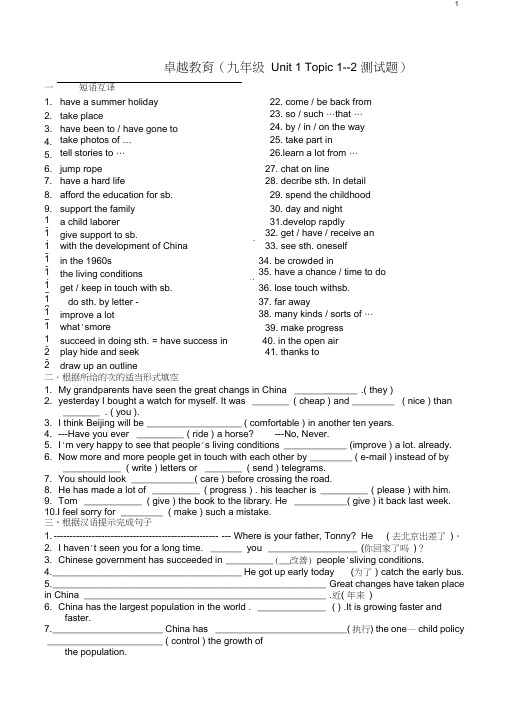
卓越教育(九年级Unit 1 Topic 1--2 测试题)一、短语互译1. have a summer holiday 22. come / be back from2. take place 23. so / such …that …3. have been to / have gone to 24. by / in / on the way4. take photos of …25. take part in5. tell stories to …26.learn a lot from …6. jump rope 27. chat on line7. have a hard life 28. decribe sth. In detail8. afford the education for sb. 29. spend the childhood9. support the family 30. day and night1 0. a child laborer 31.develop rapdly1 1. give support to sb. 32. get / have / receive aneduca1 2. with the development of China 33. see sth. oneself1 3. in the 1960s 34. be crowded in1 4. the living conditions 35. have a chance / time to dosth.1 5. get / keep in touch with sb. 36. lose touch withsb.1 6. do sth. by letter - 37. far away1 7. improve a lot 38. many kinds / sorts of …1 8. what'smore 39. make progress1 9. succeed in doing sth. = have success in 40. in the open air2 0. play hide and seek 41. thanks to2 1. draw up an outline二.根据所给的次的适当形式填空1. My grandparents have seen the great changs in China ____________ .( they )2. yesterday I bought a watch for myself. It was _______ ( cheap ) and ________ ( nice ) than_______ . ( you ).3. I think Beijing will be __________________ ( comfortable ) in another ten years.4. ---Have you ever _________ ( ride ) a horse? ---No, Never.5. I'm very happy to see that people's living conditions ____________ (improve ) a lot. already.6. Now more and more people get in touch with each other by ________ ( e-mail ) instead of by___________ ( write ) letters or _______ ( send ) telegrams.7. You should look ____________( care ) before crossing the road.8. He has made a lot of _________ ( progress ) . his teacher is _________ ( please ) with him.9. Tom ___________ ( give ) the book to the library. He __________ ( give ) it back last week.10.I feel sorry for ________ ( make ) such a mistake.三、根据汉语提示完成句子1. ---------------------------------------------------- --- Where is your father, Tonny? He ( 去北京出差了)。
九年级英语(仁爱版)Unit 1 Topic 2 学案

Unit 1 Topic 2 The populalation in developing countries is growing faster.Section A学习目标1.学习本课新单词、词组和重点句型。
2. 学习含有just, already, yet, ever 和never 的现在完成时,并掌握它们的正确运用;3. 学习“So + 助动词/ be动词/ 情态动词+ 主语”的倒装句,并能灵活运用。
4. 自学理解课文内容,并完成相关练习。
课前练一练一、复习Unit Topic 1,根据所给中文写出下列词组,朗读并记忆:1. 发生;进行___________________2. 跟……保持联系_____________________________3. 取得进展,取得进步__________________4. 成功地做了某事______________________5. 参加;加入____________________6. 从……中学到很多_____________________7. 没时间做某事_____________________ 8. 顺便问一下__________________9. 在过去_____________________ 10. 在……起着重要作用_________________________11. 亲眼看见…… ___________________ 12. 在最近几年____________________13.遥远的____________________ 14. 在某人的业余时间____________________二、写出下列动词的过去式和过去分词形式:1.call ________ ________2. watch ________ ________3. hate _________ _________4.study ________ _________5. chat _________ ________6. find __________ _________7.lose ________ ________8. hear_________ __________9. go _________ ________ 10. make _________ ________ 11. run _______ ________ 12. lend _______ __________自主学习(一)预习P127 Unit 1 Topic 2 Section A 新单词和词组,根据中文提示写出对应的英文:1. 还,仍__________2. 很可能,大概______________3. 电影院______________4. 百货公司_____________5. 在附近,不远_______________自主学习(二)一、朗读1a,完成1b和1c。
仁爱英语九年级Unit1 Topic 2学案教案
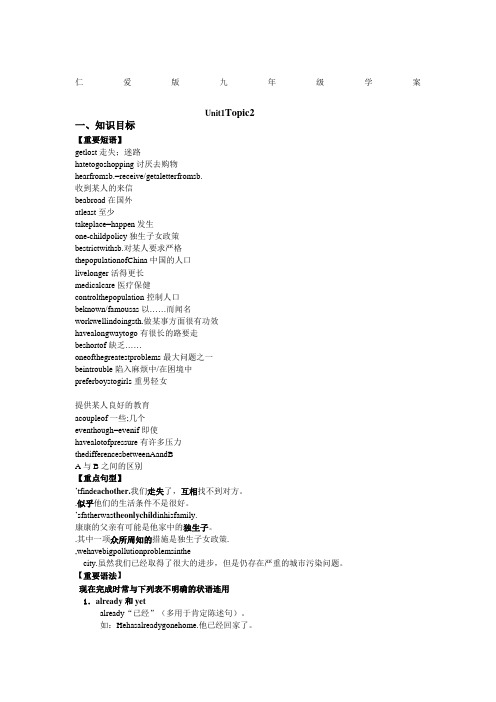
仁爱版九年级学案Unit1Topic2一、知识目标【重要短语】getlost走失;迷路hatetogoshopping讨厌去购物hearfromsb.=receive/getaletterfromsb.收到某人的来信beabroad在国外atleast至少takeplace=happen发生one-childpolicy独生子女政策bestrictwithsb.对某人要求严格thepopulationofChina中国的人口livelonger活得更长medicalcare医疗保健controlthepopulation控制人口beknown/famousas以……而闻名workwellindoingsth.做某事方面很有功效havealongwaytogo有很长的路要走beshortof缺乏……oneofthegreatestproblems最大问题之一beintrouble陷入麻烦中/在困境中preferboystogirls重男轻女提供某人良好的教育acoupleof一些;几个eventhough=evenif即使havealotofpressure有许多压力thedifferencesbetweenAandBA与B之间的区别【重点句型】’tfind eachother.我们走失了,互相找不到对方。
.似乎他们的生活条件不是很好。
’sfatherwas theonlychild inhisfamily.康康的父亲有可能是他家中的独生子。
.其中一项众所周知的措施是独生子女政策.,wehavebigpollutionproblemsinthecity.虽然我们已经取得了很大的进步,但是仍存在严重的城市污染问题。
【重要语法】现在完成时常与下列表不明确的状语连用1.already和yetalready“已经”(多用于肯定陈述句)。
如:Hehasalreadygonehome.他已经回家了。
yet“已经;还”(用于否定句或疑问句)。
- 1、下载文档前请自行甄别文档内容的完整性,平台不提供额外的编辑、内容补充、找答案等附加服务。
- 2、"仅部分预览"的文档,不可在线预览部分如存在完整性等问题,可反馈申请退款(可完整预览的文档不适用该条件!)。
- 3、如文档侵犯您的权益,请联系客服反馈,我们会尽快为您处理(人工客服工作时间:9:00-18:30)。
仁爱版九年级学案Unit1 Topic 1一、知识目标【重要短语】have a good summer holiday 过愉快的暑假come back from…从……回来work for …为……工作feel sorry for…对……深表同情a disabled children’s home残疾儿童养育院the whole holiday 整个假期tell stories to kids 给小孩讲故事learn…from 从……当中学习feed a child 喂小孩do farm work 干农活go to summer classes 上暑期班write an article about…写篇有关…的文章have a hard life 过着艰苦的的生活in the past/ future 在过去/ 在将来in detail 详细地at sunrise 在日出时have no chance to do sth. 没有机会做某事afford ( to do) sth 担负得起(做)某事give support to sb. 给某人帮助/支持get a good education 获得良好的教育search…for…为了……搜索……have little food to eat 吃不饱dress warmly 穿得暖with the development of…随着……的发展have a balanced diet 饮食均衡play musical instruments 演奏乐器sleep in the open air 在户外睡觉study/ go abroad 在国外学习/ 出国win/ lose a competition 赢得/ 输掉比赛enjoy Beijing Opera 欣赏京剧used to do sth. 过去常做某事at sunrise 在日出时go hungry 变饿了fall ill 得病/ 患病divide …into…把……分成……feel satisfied with…对……感到满足see …. oneself 亲眼看见……make progress 取得进步thanks to 多亏; 幸亏;由于stand for 代表with the help of…在……的帮助下draw up an outline 拟定提纲【重点句型】1.You have just come back from your hometown. 你刚刚从你的家乡返回。
2.There goes the bell.= The bell is ringing. 铃响了。
3.Have you spent the whole holiday working here? 你整个暑期都在那里工作吗?4.Is that so? 真是那样吗?5.Can you describe it in detail? 你能详细地说说吗?6.Our job was to grow cotton.(作表语)我的工作是种植棉花。
7.I had to divide my money into two parts. 我不得不把钱分成两份。
8.He has seen the changes in Beijing himself. 他亲眼目睹了北京的变化。
9. I think it is important to r emember the past, live in the present and dream about the future. 我认为记住过去、立足现在、展望未来非常重要。
10.Thanks to / Because of the government’s efforts.由于政府的努力。
【词形转换】training (动词)——train“训练”whole (同音词)——holetidy (近义词)——cleandevelop (名词) ——development(形容词)——developed“发达的”developing“发展中的”rapid (副词)——rapidly old (比较级) ——older; elder recent (副词) ——recently narrow (反义词)——wide title (近义词) ——subject【重点语法】(一)现在完成时:表示过去已经发生或已经完成的某一动作对现在造成的影响或结果。
即“过去的动作+ 现在的结果”,强调结果。
如:I have bought a new bike. (= I bought a new bike, and I have a new bike now.)我已经买了一辆新的自行车。
(强调我现在有了一辆新车。
)构成形式:助动词have / has + 动词的过去分词1.肯定句:I have seen the film. 我已经看过这部电影。
否定句:I haven’t seen the film. 我没看过这部电影。
一般疑问句:Have you seen the film? 你看过这部电影了吗?回答:Yes, I have.是的,我看过了。
No, I haven’t.不,我没看过。
特殊疑问句:What have you done?你已经做了什么?2.肯定句:He has finished the task. 他已经完成了任务。
否定句:He hasn’t finished the task. 他还没有完成任务。
一般疑问句:Has he finished the task? 他已经完成任务了吗?回答:Yes, he has.是的,他完成了。
No, he hasn’t.不,他没有完成。
特殊疑问句:What has he finished? 他完成了什么?(二)have/ has been to与have/ has gone tohave/ has been to + 某地,到过某地,说话时人已经回来了。
have /has gone to + 某地,说明去了某地,说话时人还没回来。
如:I have been to Beijing twice. 他去过北京两次。
---- Where is Jim? 吉姆在哪儿?---- He has gone to the library? 他去图书馆了。
二、要点讲评1.Though I had no time to travel, I still felt very happy this holiday!尽管我没时间去旅游,但这个假期我仍然感到很愉快。
though 从属连词,用来引导让步状语从句,表“虽然;尽管”,不能与but连用。
如:Though he is poor, he is happy. = He is poor, but he is happy.2.Could you please tell me something about Chinese teenagers?请告诉我一些有关中国青少年的一些事情好吗?Could /Would you please (not) do sth?请(不)做某事好吗?如:Could you please turn down your radio? 请把收音机声音调低好吗?Would you please not play football here? 请不要在这儿踢球好吗?3.Parents couldn’t afford education for their children. 父母供不起孩子上学。
afford 常与can, could 或be able to 连用,尤其用于否定句或疑问句,表“负担得起(做)某事;抽得出(时间)”“(can’t/ couldn’t) afford (to do) sth.”如:We can’t afford (to buy ) this house because we don’t have enough money.我们买不这房了,因为我们没有足够的钱。
He felt he couldn’t afford any time to play football. 他觉得自己没有时间踢球了。
3.Our government gives support to poor families. 我们的政府能为贫困家庭提供帮助。
give support to sb.= give sb. support 为某人提供帮助/ 支持support作动词时表“供养;支持;支撑”。
如:She had to support her family at the age of ten. 她十岁时就得养家。
His parents supported him in his decision.他的父母支持他的决定。
The two sticks support the tree. 两根木棍支撑着这棵树。
4.Why not go and search the Internet for some information?为什么不上网查找相关信息呢?search sp. for sth. 搜查某地寻找某物search sb. for sth. 搜身查找某物search for sth./ sb.= look for sth./ sb. 搜寻某物/ 某人。
如:The villagers searched the woods for the lost children.村民们在树林里寻找失踪的孩子们。
The police searched the man for the stolen money. 警察搜那个男人的身,查找被偷的钱。
He is searching/ looking for his missing keys. 他在寻找他丢的钥匙。
5.I used to be a chilld laborer. 我以前是一个童工。
used to be/ do…过去曾是/常做……be used to do sth. = be used for doing sth. 被用来做某事be/ get used to (doing ) sth.习惯于(做)某事。
如:I used to be a Chinese teacher. 我过去曾是一名语文老师。
I used to swim in this river. 我过去常在这条河中游泳。
Knives are used to cut things.= knives are used for cutting things. 刀子被用砍东西。
We are used to getting up earlier now. 现在我们习惯于早起。
